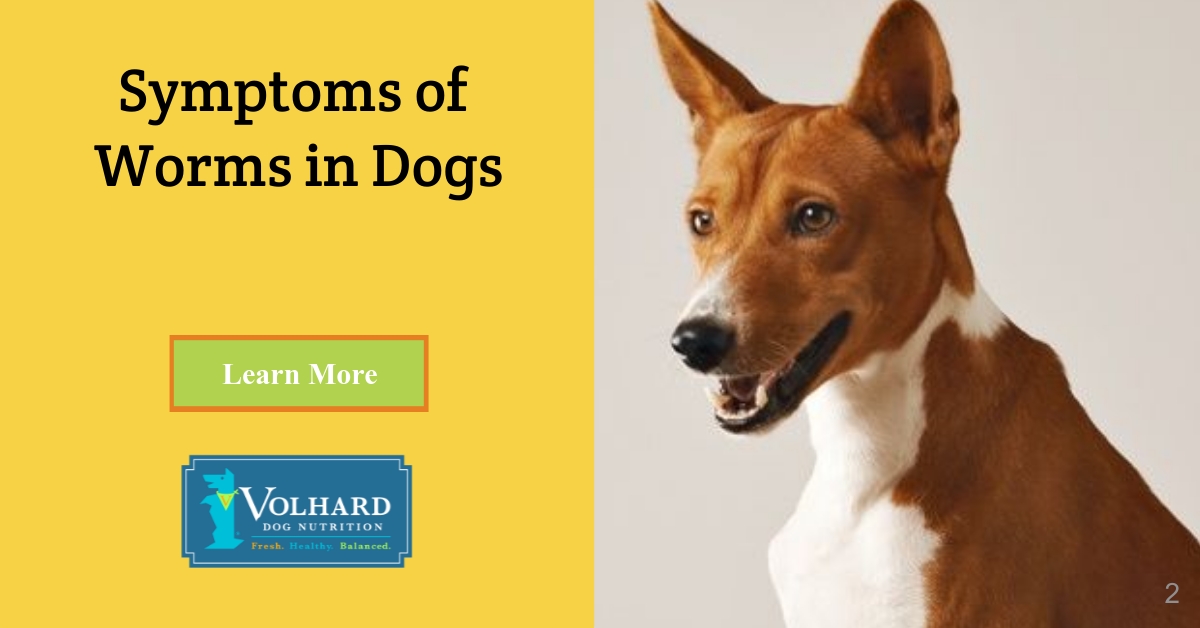Are the Worms in Your Dog a Sign That it's Time to Change Food?
Posted by Volhard Dog Nutrition on Feb 17th 2021
Keeping our faithful canine companions away from disease is a job that we, as dog owners, must take very seriously. During their lifetime, dogs are most likely to encounter numerous harmful bacteria—after all, pesky enemies of miniature proportions can lurk everywhere. Did you know that your puppy or kitten can be born with intestinal parasites? Also, if you have a poop eater, you definitely want to listen up! A strong and healthy immune system is the best way to prevent disease, including intestinal parasites. By feeding foods that are anti-inflammatory and biologically appropriate for your dogs, you will optimize their overall health.
Out of those, some of the grossest, harmful intruders for your canine friend are worms.
While, in most cases, these annoying parasites only cause minor discomfort to your dog, in other cases, they can lead to more severe symptoms, further decreasing your dog’s overall health and well-being.
Needless to say, dealing with these intruders is an urgent matter for every dog owner.
The manner of doing it, however, might differ.
Instead of rushing to conventional deworming drugs (which are harsh to your furry friend), we think it wiser to add a few day-to-day ingredients to your dog’s diet for a more natural and dog-friendly approach to deworming.
Let’s take a journey to the land of proper dog diet and learn how to cure your furry friend of worms using simple home remedies!
Dog Worms & How to Detect Them
Parasites thrive on excess mucus and wastes remaining inside following bowel movements. Worms excrete even more toxic substances and can create a myriad of symptoms including headaches, insomnia, nervousness and weight problems.
Imagine going outside to pick up the dog poop and there it is—a long white worm squirming around in your dog’s poop.
It’s horrifying because you know there are more in your dog. You may even panic and worry if your family can get them, too!
Roundworms can also be passed from the mother to the pup through the placenta or in the milk. This is one of the main reasons why the vet deworms your puppies so frequently when you first get them.
Other routes of transmission include fleas or eating mice, rabbits, or small rodents. So, if you have an outdoor cat, you need to be checking stool samples frequently for intestinal parasites and the same with your dogs if you have a dog that is an avid hunter.
What are the Differences Between Worms?
- Roundworms or ascarids (their spaghetti-like shape can be detected in your dog’s stool)
- Tapeworms (noted on the surface of the stool or around the anus as small flat ¼-inch white segments filled with eggs)
- Hookworms (less than an inch long, they attach themselves to the intestinal lining)
To check for intestinal parasites, you should schedule a fecal analysis for your dog at least twice a year, especially during fall and winter.
This process is necessary because several internal parasite eggs (e.g., roundworms, hook, and whipworm eggs) can only be traced under the microscope.
However, specific parasites such as heartworms require different screening methods for detection (i.e., blood tests).
Make sure that you check out our “Transforming your dog’s health” blog series on wellness exams.
Symptoms of Dog Worms
Intestinal parasites can do a lot of unnecessary harm to your furry friend, which is why keeping a watchful eye on your dog is essential. If you’ve noticed the following recurring symptoms, it might be the right time to schedule a fecal analysis for your canine friend:
- Vomiting and diarrhea
- Anal irritation
- Excessive coughing
- Bleeding in the colon (large bowel) and rectum
- Undigested food material, muscle, fat, and starch granules
- Distended or swollen abdomen
How to Cure Your Dog of Worms With a Proper Diet
The good news is, with the right ingredients, curing your dog of worms can be achieved without relying on harmful deworming medicine!
A whole-food, raw meat-based diet is one of the superior options for a worm-free dog since it contains the right ingredients for a healthy digestive system.
However, because of the high levels of starch and sugars, kibble diets will make your furry friend more susceptible to worms than raw-fed dogs—intestinal parasites thrive on the starch and sugars found in kibble.
What are Some Natural Treatments for Intestinal Parasites?
When you use natural remedies or dewormers in general, it’s often recommended to start your protocol on a full moon.
Parasites are more active and accessible during these times. Parasites can be really difficult to get rid of, which is why it’s imperative to work with your vet and perform routine fecal testing to make sure your pet got rid of the parasites.
Keep in mind that each pet is different.
There are numerous cases that didn’t respond to conventional dewormers and then respond to natural dewormers, but also vice versa.
Essential oils can be very powerful.
There are a lot of other natural remedies ranging from herbal medicines (Western to Chinese) to certain foods like garlic to even using diatomaceous earth.
#1: Garlic
Wait—isn’t garlic toxic to pets? Yes and no.
Garlic is safe when used in moderation and has many therapeutic properties. It has a history of killing parasites and also detoxifies while gently stimulating elimination.
The main active component in garlic is allicin and these are the compounds that can kill amoebas and parasites, like hookworms.
However, garlic is often misused.
Allicin is not present in garlic in its natural state or when it’s found as a supplement.
When garlic is chopped or otherwise damaged, the enzyme alliinase acts on the chemical alliin, converting it into allicin, which is the active component for killing parasites.
Allicin is only beneficial when freshly chopped, too.
If you want the medicinal properties of garlic to work then you have about 8-9 minutes to cut the garlic and feed it before there is no more allicin available.
The dose you’d use for your dog is ¼ clove per 10lbs body weight per day. Remember to buy it fresh and chop about 10 minutes before adding it to the food.
#2: Wormwood (Artemisia)
This herb has been shown to have anti-parasitic effects on all types of intestinal parasites, including tapeworms.
However, the tannins that are present in wormwood can be harsh on the GI tract and can affect the kidneys and liver, leading to diarrhea and adverse effects.
If your pet already has kidney and liver issues, we do not recommend using products with this herb present.
#3: Black Walnut
Black walnut is another common anti-parasite treatment.
This herb has been known to actually expel intestinal parasites and even heartworm.
However, this herb can be toxic if the wrong dosage is used.
The main issue with using black walnut is that moldy hulls and nuts can contain neurotoxic mycotoxins that can lead to adverse effects like hyperexcitability and muscle tremors.
Higher dosages can also lead to GI upset and diarrhea.
However, using veterinary products that have been formulated by veterinarians for short-term usage can be effective for expelling intestinal parasites.
#4: Pumpkin Seeds
Pumpkin seeds contain cucurbitacin which has been shown to possess anti-parasitic activity since it has the ability to paralyze worms so they drop off of the intestinal walls.
The pumpkin seeds need to be fresh and organic.
They can be fed either as a treat or as part of the meal. You will want to grind them prior to putting in the food.
The dosage is 1 tsp. per 10lbs of your pet’s body weight per day.
#5: Diatomaceous Earth
You must use food-grade. The pool-grade version is toxic to your pets.
Volhard Dog Nutrition diets have this ingredient in them already so no additional additions are necessary to maintain a healthy worm-free body!
The dosage is 1/4 tsp. per day into the food for a small dog and up to 1 tsp. for dogs over 55 lbs.
This can help reduce the number of intestinal parasites.
Studies have shown that free-range organic laying hens had reduced numbers of parasites present when fed food-grade diatomaceous earth.
Another key fact to remember is that diatomaceous earth can easily be inhaled and lead to adverse health effects.
The shell remnants (or diatoms) are irritating to the outside of the worms and make them lose their grip on the intestinal wall.
Make sure to protect yourself and your pets when using this product, and thoroughly mix it into a hydrated diet when using this.
What Ingredients Should You Use to Maintain a Worm-Free Body?
#1: Fermented Vegetables
Fermented vegetables such as kimchi and sauerkraut contain enzymes that improve food digestion and stool passing, gradually expelling intestinal parasites.
Furthermore, they provide a superior source of probiotics and antioxidants, essential for a strong immune system.
Best practice: Begin by slowly introducing fermented veggies into your dog’s diet until it becomes accustomed to the smell and taste.
The recommended intake of fermented veggies for your dog is 1-3 tsp. per day per 20 lbs. of body weight.
#2: Wheat Bran
Wheat bran provides the much-needed fiber for proper stool formation and elimination of waste materials through the colon.
With a clean colon comes an inhospitable environment for worms.
Furthermore, the high fiber content helps to prevent other colon diseases, such as cancer.
Best practice: You can purchase either dog food with a high wheat bran content or supplements in the form of powder.
If you decide to go with the latter, mix the powder into the dog’s food while adding water to make it more palatable.
Healthy amounts of wheat bran can be found in our Volhard foundation mixes.
#3: Yoghurt / Kefir
Both intestinal worms and deworming medicine take their toll on the bacteria present in your dog’s large intestine, which is necessary for normal stools. Yogurt and kefir restore the good bacteria, improving your dog’s digestive system.
Best practice: Small dogs require anywhere between 1 tsp. to 1 Tbsp. / day, while large dogs can receive anywhere upward to 3 Tbsp. / day.
Mix the yogurt or kefir into your dog’s food or serve it as a separate treat.
#4: Carrots
This common vegetable is a very healthy treat for dogs.
Coarsely chopped carrots clear the stomach and intestine walls of intestinal parasites.
Furthermore, they are a rich source of fiber and beta-carotene and are known to improve dogs’ dental health.
Best practice: Carrots should be served as a tasty treat or fed to your dog during meal times.
#5: Coconut Oil
Aside from its numerous health benefits (e.g., improved skin and coat, improved dental health), coconut oil is a natural vermifuge.
Regularly feeding it to your dog will gradually help it get rid of intestinal parasites.
Best practice: Sprinkle anywhere between 1 tsp. (small dogs) and 1 Tbsp. (large breeds) on your dog’s food.
Choosing the Right Diet for Your Dog
Here at Volhard, our mission is to keep your canine friend healthy, happy, and ready to enjoy its life as your trusted companion. Remember, when your dog has a strong, healthy immune system and GI tract, they are less likely to have parasites, externally and internally. By feeding a biologically appropriate diet, reducing the number of chemicals and drugs you use on your pets, they will be healthier, happier, and live a longer and more vibrant life. For more advice on dog nutrition, health, and training, make sure that you contact us and check out our blog!
Volhard Dog Nutrition and its expert nutritionists are now offering online consultations to help more dog parents discover why, what, and how to feed their dogs the healthiest of foods! Speaking to a Volhard nutritionist will help you understand the inseparable relationship between healthy food, a healthy body, and a healthy mind. If you're interested in contacting one of our Volhard nutritionists, don't hesitate to access our consultation page!



